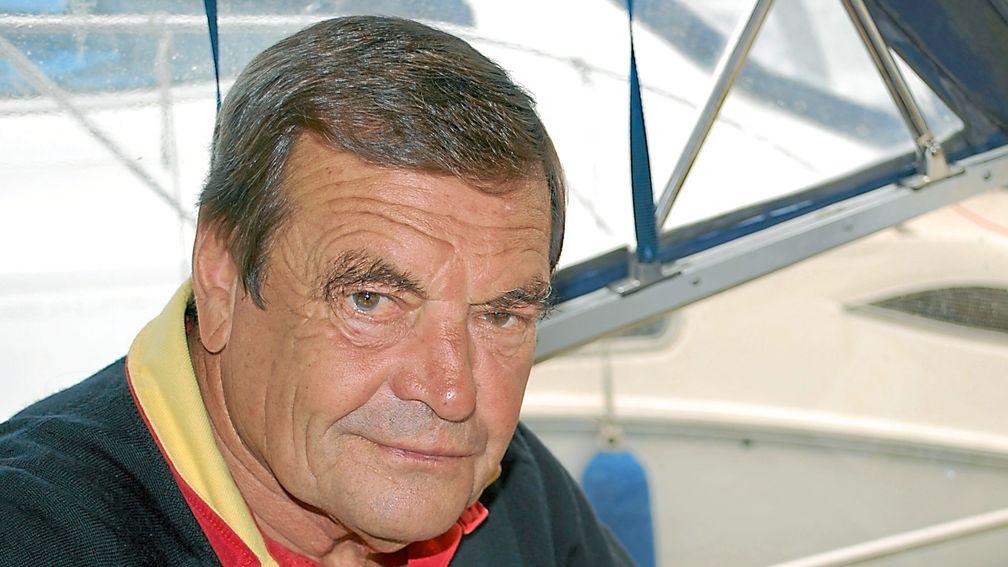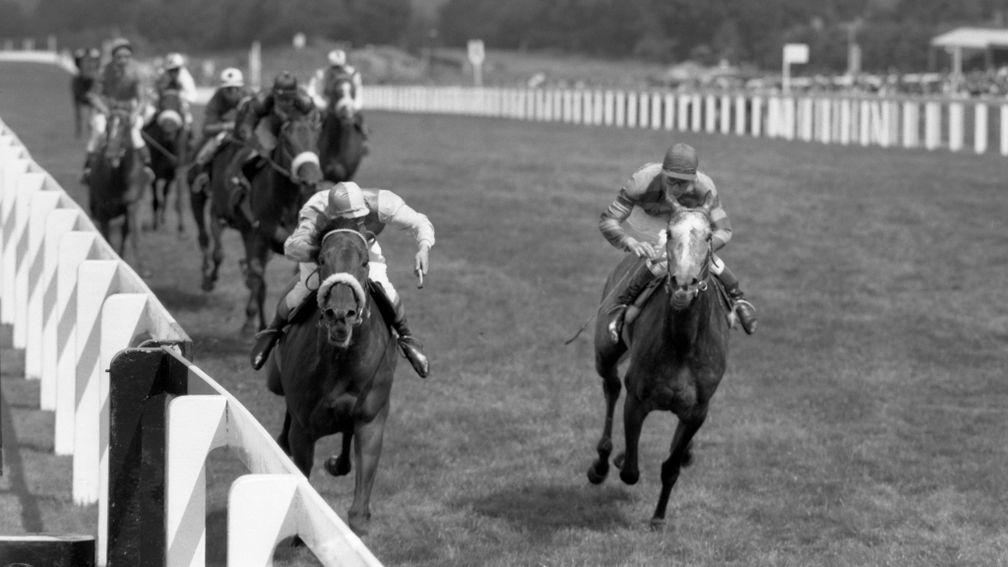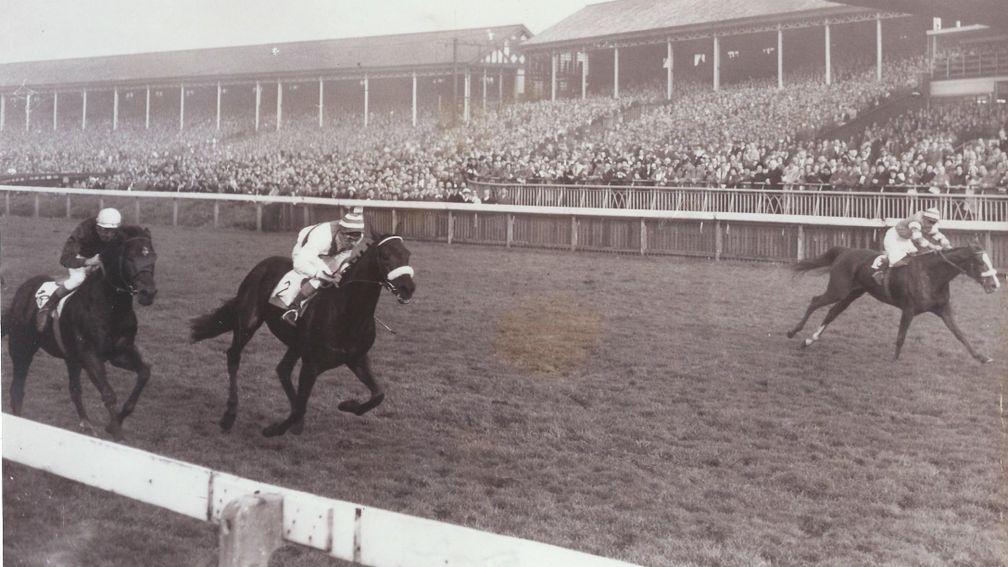Jimmy Lindley: a riding great renowned for his style, tactical nous and strength

Jimmy Lindley, who has died aged 86, was a world-class jockey throughout the 1960s and early 1970s, winning three British Classics and a string of other big races.
The most famous of his 1,000-plus wins world-wide was his triumph on Aggressor in the King George VI and Queen Elizabeth Stakes in 1960, only two years after he had ridden Retour De Flamme to be third in the Champion Hurdle.
He later became a familiar face and voice to a later generation of racing fans thanks to nearly 30 years behind the microphone at the BBC.
Yet life was never easy for a man born barely four years before the outbreak of World War II and he believed he was "three times lucky" just to be around to achieve what he did.
After moving to Eastbourne in Sussex from his north London birthplace at the age of two, he was buried for eight hours when his parents' house was flattened by a German bomb. When they moved up the road, another raid blew the windows out and going to live with his grandmother in Kent offered no escape, as a bomb landed in her garden.
Lindley had acquired a taste for riding before the war as a three-year-old on board the pony who pulled the Eastbourne milk cart, and that led to his becoming apprenticed to Tom Masson in nearby Lewes – then a notable training centre – at the age of 14 in 1949.
Masson had a reputation for getting the best out of problem horses and Lindley was always grateful for the tuition he received from a trainer who believed that riding was an art form.
He rode his first winner on Sweet Phoenix for Harry Hannon (grandfather of current trainer Richard Hannon) at Brighton in 1952, weighing out at 7st 1lb, and had his first major success on Damremont in the City and Suburban Handicap at Epsom the following year.
But after riding out his claim, Lindley's weight ballooned during a spell in India in the mid-1950s and he found rides drying up, so much so that he joined his future father-in-law Matt Feakes for two seasons over jumps. He won the Oteley Hurdle on Retour De Flamme in 1958 and finished third on that horse in the Champion Hurdle 17 days later.
Lindley felt that time toughened him up and experiencing the perils of jump racing certainly stood him in good stead when Jack 'Towser' Gosden (father of current trainer John Gosden) asked him to try his luck on Aggressor, the awkward horse who would change his career.

On their first public outing in the Solario Stakes the big, burly colt went over the wall on the rhododendron walk at Sandown and the pair ended up in the bandstand.
But they went on to record a string of notable successes, culminating in the five-year-old's defeat of the supposedly unbeatable Petite Etoile in the King George at Ascot. The 2-5 favourite had won the 1,000 Guineas and Oaks but Lindley doubted Lester Piggott's mount truly stayed a mile and a half and he was determined to test her stamina.
With heavy rain turning the ground in the mudlark's favour, he gave Aggressor an attacking ride, kicking on some way out, and his judgement was proved spot on as Petite Etoile was still half a length adrift at the line.
"It was a great day and a turning point in my life," Lindley recalled later, looking back on an afternoon when his reputation was made as a top-class jockey and the go-to man for trainers needing a substitute for one of their stable stars.
No-one was stronger than him in a finish, and it was no coincidence that each of his three British Classic wins – in the 2,000 Guineas on Only For Life (1963) and Kashmir (1966) and the St Leger on Indiana (1964) – was achieved by a head or short head on a colt who was no superstar.
Lindley was also renowned for his style and his tactical nous, as he showed when his plan to get first run on doubtful stayer Kashmir paid off in the Guineas. He went three lengths clear at the Bushes and held on by a short head from 66-1 shot Great Nephew, subsequent sire of Grundy and Shergar.
He rode in the Derby for the first time a few days after his 18th birthday in 1953, but the Epsom Classic always eluded him. He came closest to victory when hitting the front a furlong out on Indiana in 1964, only to be caught by Santa Claus in the last few strides. "I'd won everywhere bar the line," he later recalled. Ironically, he nearly won the Prix de l'Arc de Triomphe on Santa Claus that autumn, finishing second to Prince Royal.
His biggest Derby hard-luck story came in 1966 when he was claimed to ride third-placed Black Prince. The owner would not let him off to partner the winner Charlottown, who he had ridden throughout the colt's two-year-old career.
Lindley's loyalty may have cost him Derby success in 1967 as he had been offered the chance to succeed Piggott as stable jockey to Noel Murless, whose Royal Palace was destined to triumph at Epsom.

At the time he had a gentleman's agreement to ride for Jeremy Tree, for whom he had partnered Only For Life and champion two-year-old Double Jump, and he chose not to leave Beckhampton, a decision he later called the biggest disappointment of his career.
Dick Hern used him with success on Galivanter, Highest Hopes, Sun Prince and Sallust, and would have given him the leg-up on Brigadier Gerard at Royal Ascot in 1972 had stable jockey Joe Mercer not recovered from a plane crash two days before. He sometimes rode that great champion on the gallops.
He became stable jockey to up-and-coming trainer Guy Harwood – the partnership won the Queen Elizabeth II Stakes with Jan Ekels – and spent one year, 1973, in France with trainer Richard Carver, winning the Prix du Cadran and Ascot Gold Cup on Lassalle.
Lindley's weight problems meant he was never in contention for the jockeys' championship with his friends and contemporaries Piggott and Mercer. He never finished better than ninth in the table, with a best score of 71 in 1963. He won a career total of 907 races in Britain (including 25 over jumps), but statistics did not do him justice.
When asked what he would have changed about his life, he said: "I'd have liked to be about 7lb lighter than I was."
Classic-winning jockey and popular broadcaster Jimmy Lindley dies aged 86
His battle with the scales took its toll. He later recalled that, apart from one small glass of white wine, "the only other fluid that passed my lips all day was the water off my toothbrush".
The damaging effect of his wasting regime led a kidney expert to advise him to retire at the age of 39 in 1974 – just as the BBC needed a paddock commentator following the death of Clive Graham.
He soon became an integral part of the racing team, at a time when it covered the sport extensively, and he was always proud of its coverage.
"When I was working for the BBC the producers all loved racing and you could feel it through the television pictures," he said. "It's like with anything, if you have a passion for what you're doing then it will show."
Lindley was among those on stage at the Lancaster Hotel in London when the BBC team received a HWPA award marking the end of its racing output. But when asked later about the enforced ending of his broadcasting career, he admitted: "I don't miss it at all, I was never happy doing it. Why did I do it for so long, in that case? The money, of course, and a man needs a focus, needs to have something to get up in the morning for."
He claimed "never to be a natural" at broadcasting and said, "I loved being a jockey, loved the horses, would have loved to have gone on for another ten years".
Lindley is survived by his wife Pat, trainer Matt Feakes's daughter whom he married in 1959, and sons Bruce and Mark.
Published on inNews
Last updated
- Join Racing Post Members' Club for the very best in racing journalism - including Patrick Mullins' unmissable trip to see Gordon Elliott
- Join the same team as Ryan Moore, Harry Cobden and other top jockeys with 50% off Racing Post Members' Club
- Racing Post Members' Club: 50% off your first three months
- 'It’s really exciting we can connect Wentworth's story to Stubbs' - last chance to catch master painter's homecoming
- The jumps season is getting into full swing - and now is the perfect time to join Racing Post Members' Club with 50% off
- Join Racing Post Members' Club for the very best in racing journalism - including Patrick Mullins' unmissable trip to see Gordon Elliott
- Join the same team as Ryan Moore, Harry Cobden and other top jockeys with 50% off Racing Post Members' Club
- Racing Post Members' Club: 50% off your first three months
- 'It’s really exciting we can connect Wentworth's story to Stubbs' - last chance to catch master painter's homecoming
- The jumps season is getting into full swing - and now is the perfect time to join Racing Post Members' Club with 50% off